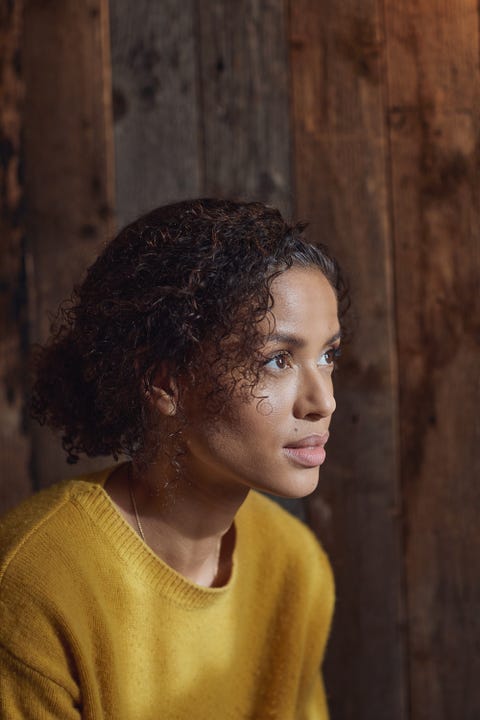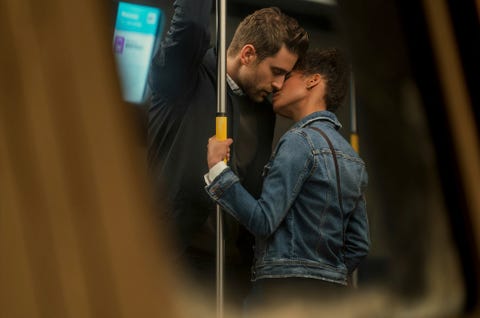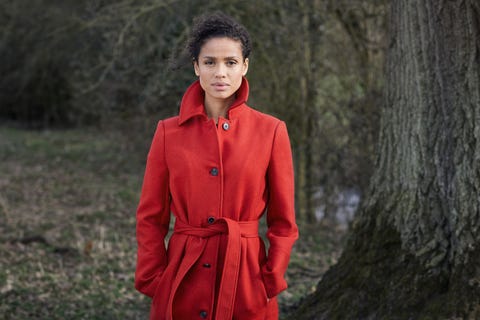When Gugu Mbatha-Raw first received the script for Surface, she was in Atlanta, filming the first season of Loki—about to become an enormous hit for the still-building Disney+ platform. It was the late summer of 2020, and she was content, if not exactly challenged, in the iron-pressed shirt collar and necktie of Ravonna Renslayer. She ached for an opportunity to stretch stiff muscles, especially as the pandemic continued the squeeze the television industry.
“I had a great experience on Loki,” she tells me when we meet for lunch in Midtown Manhattan this July. “But I think the Marvel world is a particular genre. So it was very refreshing to me to read Surface at the time, because it was so different to what I was working on.”
She already had a connection to the production company behind Surface: Hello Sunshine, co-founded by Mbatha-Raw’s The Morning Show cast-mate Reese Witherspoon. From Atlanta, she Zoomed with Surface showrunner Veronica West, with Witherspoon herself, and with Hello Sunshine President of Film & TV Lauren Neustadter. Together, they took the pitch to Apple, “and they pretty much bought it right away,” Mbatha-Raw says.
By Thanksgiving of 2020, a writers’ room was at work, and by June 2021, Mbatha-Raw was on set in Vancouver, in the lead role of Sophie, an amnesiac struggling to make sense of her life and relationships after a presumed suicide attempt leaves her without memories. As an executive producer as well as actress for Surface, she’d had a heavy hand in everything from Sophie’s musical tastes to who would play her co-stars, including Oliver Jackson-Cohen as Sophie’s husband, James, and Ari Graynor as her friend Caroline. As such, Mbatha-Raw’s tastes are felt throughout the series; her, as she puts it, “British sensibility” adds gloss and dimension to what might otherwise feel—if you’ll forgive me—a mere surface-level investigation of monied myth-making.
As the series speeds toward its finale, critics have widely deemed Mbatha-Raw as the standout in an otherwise mixed reception. Her face—Sophie’s face—contorts as she learns new details about her past lives, but even more so as she learns how to harness those details. Surface’s protagonist is not innocent, neither before nor after her accident, and the thrill of connecting those two threads is most evident in Mbatha-Raw’s performance, as she spins the wheels of reinvention behind Sophie’s tony exterior.
In a wide-ranging conversation ahead of the Surface premiere, I learned how Mbatha-Raw poured both her practical and artistic skills into Surface, what she hopes for the future of the series, and how her time on Loki has informed her future creative endeavors.
You mentioned before that your preparation for this character was different than your previous roles—because Sophie needed to be a “blank slate.” I’m curious how you balanced that need to be a blank slate with the fact that you were also executive producing, so you were deeply immersed in creative choices surrounding her story.
I always like to know where I’m going. Because I think it helps you arc [your choices]. And so, for me, even though I knew where it was going, it enabled me to then feel like, How far can I stretch this person? How many nuances can I give her? How many facets can I find? And make her as messy and flawed and real as possible.
And I was really fortunate that, because I was moved to executive producer, I was very much immersed in the pre-production, but also, I’m not the only producer. I mean, there’s full-timers on this who are much more experienced than me that I can really trust when I’m on set. I don’t have to micromanage. We’ve done the preparation, then I’m Sophie. And then, in [post-production] or other conversations not around the set, I can still have a voice in, but I don’t feel like I have to carry everything.
What did you find was most challenging to make authentic about Sophie, given her “blank slate” status?
When you’re dealing with a glamorous world, I’m always looking to find the grounded things within it. I think from the get-go, this show is going to look gorgeous, stylish, and noir. And a lot of the inspirations for the show, visually, came not just from things like Vertigo or Last Year at Marienbad, but even Sam Miller, our director, brought in images from Eyes Wide Shut. So it was always going to look seductive, and I think with that, I always wanted to make sure that there was still a grit. And that Sophie is genuinely running with no makeup on. When she’s genuinely sweating, when she’s running up those hills in San Francisco. Even though it’s a glamorous world, we need to sort of feel like we can find the human chinks.
It was interesting, for someone whose life is so painted-on, to show the moments where she’s raw. And then for even those moments to feel disorienting, like maybe they’re not real.
We also talked about a lot, the idea that, genuinely, if you can’t remember who you are, it’s like, “Well, what do I do?” You go into your closet, and you’re like, “Wow. What is all this stuff on the counter? And what do I do with all of this makeup? How do I do my makeup?” It’s kind of liberating in a way, because you’re not having to paint on the social convention.
I think it was important to start from an accessible place of somebody who’s open-eyed and not polished. Because she’s not a polished person, even though she lives in a very affluent world. She’s still figuring out, what is this polish even for? Why are people doing this?
It reminds me of the first episode of her with her friends at lunch. “Are these my friends? Why would these be my friends?”
“What is this small talk? And is that really funny? Do I like them? And was that a backhanded compliment?”
And then there’s the scene in episode 1 where she’s rediscovering the music she loves. That was such a fantastic montage. What went into the selection of those songs in particular?
Some were in the script. So things like “A Love Supreme” by John Coltrane, Radiohead, Pablo Honey, those definitely, [showrunner Veronica West] wrote those in very early on. [Director] Sam Miller has amazing taste in music as well. And so it became a conversation, because they said, “You’re the one that’s got to dance to these records, so what are you going to dance to? And what’s going to unlock something in you?”
They just set the camera rolling, two cameras rolling, about 45 minutes. We didn’t cut, and I just improvised. It’s really condensed in the show. But it felt like we were liberated from the script, and I could just be Sophie. That sense of discovery and newness. What if you had never heard Radiohead? What if you’d never heard one of the greatest saxophonists of all time, and you hear them for the first time as an adult? What is that like?
[In episode 6], then, it intersects with James and their backstory a bit more.
Assuming that you want to continue executive producing in other projects, what about this experience showed you what you want to do in the future?
I mean, it made me value…you always know this, but how collaborative this process is, and I think how important it is to surround yourself with people that stretch you. Not just your doppelgängers. It’s great to have people to share your taste, but I think it’s also good to have a creative dynamic. A good creative dynamic comes from stretch and opposing views.
And culturally—I think there’s a difference, in a British sense of it. As global as the world is, there’s still a sensibility, a British sensibility and an American sensibility. I’ve worked and spent a lot of time in the U.S., so it’s not new to me. But, in terms of visually, in terms of what people are used to culturally seeing on TV—bringing my own personal taste into that conversation as well.
So we’ll see. Fingers crossed for a season 2. But yeah, I mean, I feel like I’m still digesting what I’ve learned.
You mentioned hoping for a season 2. Is this something where you have a multi-season arc planned out?
[Smiles.] I couldn’t possibly say.
But is this the sort of thing where there’s a plan for it? Or is it more, like, If we get lucky, then we’ll do a season 2?
Well, Veronica West is very smart and has a real vision. And when you get to the end of the show, you tell me if you’re like, “Is this the end, or is this the end?”
Alright. I trust you.
You’ll know.
And not that I pay too much attention, but I don’t know how the show’s going to be received, and how much that influences what you do or not. But I know—things are already, sort of…there’s a vision, that’s all I’m saying.
Do you feel like, as your career expands and you take on new roles in a literal and figurative sense, that you—as an artist—are being seen in a new and perhaps more all-encompassing way?
I don’t know. I mean, it’s very hard to spend too much time thinking about other people’s perceptions of you, right? I’m not sure.
I mean, some people just assertive or grew up in the business, or are able to articulate what they want. But I think, for me, it certainly takes a bit of time to feel like you’ve got the experience to back up what maybe you’ve always thought or always had the instinct to do. But never wanted to come across as like, “Oh, here’s that little whippersnapper. What do they know?” Now I feel okay. Call it confidence or experience, or a combination of just settling into yourself…You’re just more in touch with yourself as a person, and therefore, able to express yourself more freely, I think, with the confidence and experience to back you up.
Do you see yourself moving away from acting and more toward work behind the camera? Or do you want to remain firmly planted in the acting world?
Oh, no. I mean, acting, I love. Acting’s the best.
And I think, I don’t know, I’m growing as a person and it’s a great way to express yourself emotionally and artistically. I’m definitely an artist at heart. As much as you learn about the business and you grow, you become that to support the art. I don’t ever really want to walk away from the artistic side. It’s just, you get a little more autonomy, maybe a little more power to steer the gaze of the show, or the gaze of the story, or the vision. But it’s all kind of feeding in to lift up the art and make it more authentic and progressive and push the culture forward.
I do have to ask about Loki. You mentioned, when you’re dealing with Marvel, it’s automatically a very different sort of project.
Yeah.
What do you like about that? What excites you about returning to that now?
Well, it’s really exciting to be a part of something that is a big hit. I’d never gone back to a second season of anything before. I’ve done just one and done, and quite deliberately never really signed up for very long-running things. The couple that I did got canceled. [Laughs.]
I’ve never done something before where you walk on the set, and even the crew and the background artists know who your characters are. That’s a different energy for me. I think more people have seen me play Ravonna Renslayer than have potentially seen me play anything. Which is weird to think, when you just think sheer numbers.
It’s also kind of fun to have different levels of attachment to different things. There’s some things where you’re executive producer; you’re in from the ground up. And then there’s some things where, I think, you relinquish control to the greater machine.
But that doesn’t mean that you can’t find fun within it. And I think it’s refreshing, in a way, to come from something where I’ve had a huge amount of responsibility to something where I’m not the lead, but I can just come in and do my thing and have fun with it. And I don’t have to watch the cuts; I don’t have to give notes on the score. I think it’s a balance. It’s knowing that it’s a great ride, but it’s not my baby. And actually, that’s healthy as well.
In our earlier chat, you mentioned the difficulty of the past couple years. I think, especially as an artist, it can be strange to jump between the difficulty of reality, to whatever world you’re creating in the moment. How do you make those jumps?
I mean, I much prefer to be in imaginary worlds. So it’s not hard for me to put down the news. It’s a relief, this. It’s a relief to have a script. It’s a privilege, so I don’t find it hard. I actually have to make myself engage with the real world sometimes, because I find so much more joy and sustenance from creating. And the intensity of filming, you’re in a bubble, and so I actually have to be actually more disciplined about checking in.
Weirdly, you can sometimes tell the truth—it’s easier to tell the truth in a fictional setting. With the focus of sustained eye contact and silence, and everybody working toward one creative goal, you can be bolder with the truth, and you can be more daring than you might dare to be.
You can be more intimate.
The character can be more sort of messy than you might allow yourself to be. You can really find truth in those moments. And that, to me, can be really exciting.
Are you happy with the direction your career is taking?
I mean, honestly, I feel like I’m just hitting my stride and getting to do the work that I dreamed of. I feel like, even though there’s those moments where everything’s happening, everything’s coming out [at once]—I have modulation in the pace of how I work and rest, and I’m quite good at resting and relaxing.
I just hope to build on what I’ve done so far. It’s exciting, I think, to have enough momentum that you can connect the dots. In the past, maybe things have been further apart or so different that people haven’t realized that the person who was in Belle was the same person that was in Beyond the Lights. And here it’s like, Oh, I can talk about Loki, and Surface, and Lift in the same breath. And it’s still recognizably me, even though they are a broad spectrum of genres.
This interview has been edited and condensed for clarity.
Lauren Puckett-Pope is an associate editor at ELLE, where she covers news and culture.


